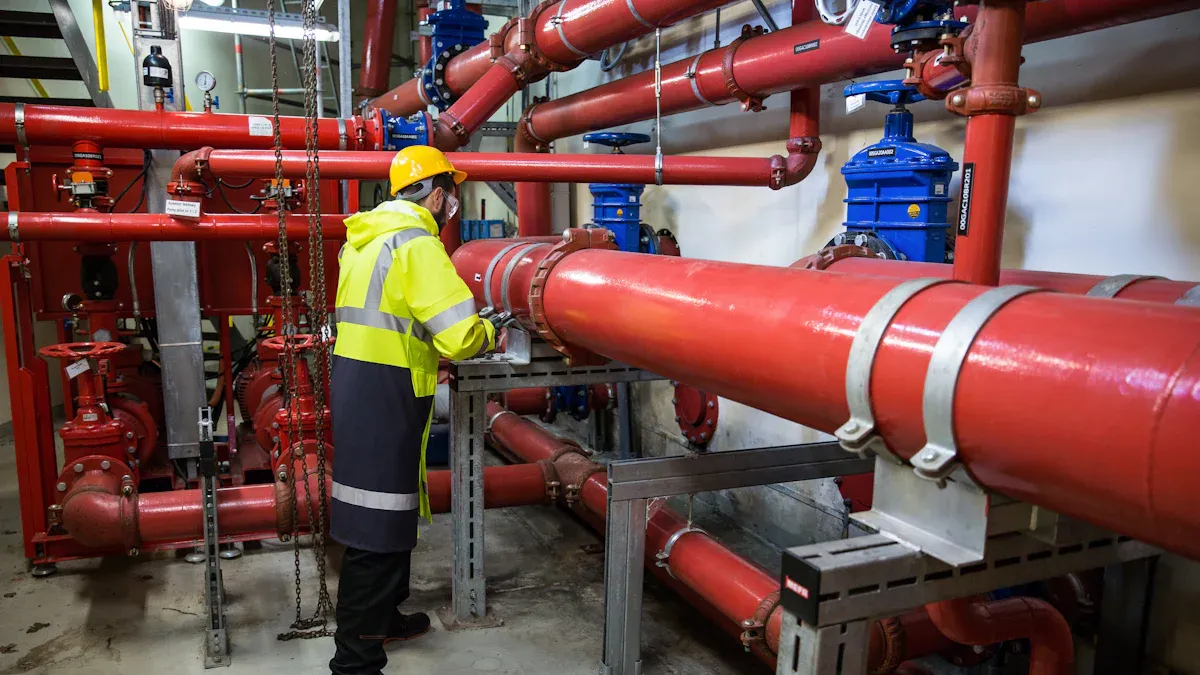
In hazardous environments, reliable communication saves lives. Explosion-proof telephones protect workers by ensuring safe and uninterrupted communication, even in extreme conditions. The market for these devices is growing rapidly, with projections showing a jump from 700 million USD in 2023 to 1.3 billion USD by 2032. Advanced technologies like VoIP systems and wireless capabilities are reshaping the way industries approach safety. Without tools like an IP Explosion Proof Telephone or an ATEX Industrial Telephone, critical industries risk accidents and non-compliance. Whether it’s a mining Explosion Proof Telephone or an emergency Explosion Proof Telephone, these devices are essential for high-risk environments.
Understanding IP Explosion Proof Telephones

What Makes a Telephone Explosion-Proof
Explosion-proof telephones are designed to operate safely in environments where flammable gases, vapors, or dust are present. These devices prevent sparks or heat from igniting hazardous substances, which could lead to explosions.
To achieve this, manufacturers use specialized materials and designs. For instance, stainless steel or aluminum enclosures protect internal components while resisting corrosion. Additionally, these telephones undergo rigorous testing to meet safety certifications like ATEX and IECEx. These certifications confirm that the device can function safely in explosive atmospheres.
Tip: Always check for certifications like ATEX or Class I Division 1/2 when selecting an explosion-proof telephone. They ensure compliance with industry safety standards.
Key Features and Benefits
Explosion-proof telephones come with a range of features that make them indispensable in hazardous environments. Here are some of the most notable ones:
- Durable Construction: Built with materials like stainless steel, these devices resist corrosion and withstand harsh conditions.
- High IP Ratings: Many models offer protection against dust and water, ensuring reliable performance in extreme environments.
- Emergency Features: Some telephones include emergency buttons or alarms for quick response during critical situations.
- Noise-Canceling Technology: This feature ensures clear communication, even in noisy industrial settings.
- Flexible Power Options: Options like Power over Ethernet (PoE) provide operational flexibility and reduce wiring needs.
These features not only enhance safety but also improve operational efficiency. Workers can communicate effectively, reducing the risk of accidents and downtime.
Industries That Rely on Explosion-Proof Telephones
Several high-risk industries depend on explosion-proof telephones to maintain safety and communication. These include:
- Oil & Gas: Refineries and offshore platforms use these devices to ensure constant communication in volatile environments.
- Chemical Plants: Explosion-proof telephones help prevent ignition sources in facilities handling flammable chemicals.
- Mining: Underground mines rely on these devices to maintain worker safety and operational efficiency.
- Manufacturing: Factories dealing with combustible dust or vapors use these telephones to comply with safety regulations.
The demand for these devices continues to grow as industries invest more in safety infrastructure. Regulatory bodies are also enforcing stricter standards, making explosion-proof telephones a necessity rather than a luxury.
Importance of Explosion-Proof Telephones in Hazardous Environments

Ensuring Safety and Preventing Accidents
In hazardous environments, safety is always the top priority. Explosion-proof telephones play a critical role in preventing accidents by ensuring reliable communication. When emergencies happen, workers need a dependable way to call for help or share vital information. These devices are designed to operate without creating sparks or heat, which could ignite flammable substances.
Modern explosion-proof telephones also include advanced features like real-time monitoring and remote diagnostics. These innovations help identify potential issues before they become dangerous. By investing in these tools, companies can reduce risks and create a safer workplace for everyone.
Note: A single communication failure in a high-risk area can lead to catastrophic consequences. Reliable tools like an IP Explosion Proof Telephone are essential for maintaining safety.
Meeting Industry Standards and Regulations
Industries operating in hazardous areas must comply with strict safety standards. Certifications like ATEX and IECEx ensure that explosion-proof telephones meet these requirements. Manufacturers invest heavily in research and development to create products that pass rigorous testing.
The demand for certified devices is growing. Over 40% of small firms find certification a challenge, but it’s a necessary step for market acceptance. Companies that prioritize compliance not only protect their workers but also avoid costly fines and legal issues.
Enhancing Communication in High-Risk Areas
Clear communication is vital in high-risk environments. Explosion-proof telephones ensure that workers can stay connected, even in extreme conditions. Features like noise-canceling technology and emergency buttons make it easier to communicate during critical moments.
Industries like oil and gas, mining, and chemical plants rely on these devices to maintain smooth operations. As the market grows, more companies are adopting smart explosion-proof telephones. These devices improve efficiency while keeping workers safe.
Key Considerations for Choosing an IP Explosion Proof Telephone
Safety Certifications (ATEX, IECEx, Class I Division 1/2)
Safety certifications are the backbone of any explosion-proof device. They ensure that the equipment meets strict industry standards and can operate safely in hazardous environments. Certifications like ATEX and IECEx confirm that the telephone won’t act as an ignition source in explosive atmospheres. For industries in North America, Class I Division 1/2 certifications are equally critical.
When choosing an IP Explosion Proof Telephone, always verify its certification. These labels aren’t just technical jargon—they’re proof that the device has undergone rigorous testing. A certified telephone provides peace of mind, knowing it complies with global safety regulations.
Tip: Look for certification markings on the device or in the product documentation. If it’s not certified, it’s not worth the risk.
IP Ratings and Environmental Protection
IP ratings (Ingress Protection) measure how well a device resists dust and water. In hazardous environments, these ratings are essential for ensuring the telephone’s durability and functionality. For example, an IP66-rated telephone can withstand powerful water jets and is completely dust-tight.
Here’s a quick breakdown of key features related to environmental protection:
| Key Feature | Description |
|---|---|
| Certification Compliance | Devices must be certified under ATEX or IECEx to ensure they do not act as an ignition source. |
| Durability and Ruggedness | Phones should have rugged exteriors and reinforced casings to withstand harsh conditions. |
| Durability Ratings | IP ratings for water and dust resistance are essential for operability in adverse conditions. |
A high IP rating ensures that the telephone can handle extreme conditions without compromising performance. Whether it’s a dusty mining site or a wet offshore platform, the right IP rating keeps communication lines open.
Material Durability and Resistance
The materials used in an explosion-proof telephone play a huge role in its longevity. Stainless steel and aluminum are common choices because they resist corrosion and can endure harsh environments. These materials also protect the internal components from physical damage.
Durability isn’t just about the exterior. The internal wiring and circuits must also withstand extreme temperatures and vibrations. A well-built telephone ensures reliable communication, even in the toughest conditions.
Note: Investing in a durable telephone may cost more upfront, but it saves money in the long run by reducing maintenance and replacement costs.
Compatibility with Industry-Specific Requirements
Every industry has unique needs. For example, oil and gas facilities often require telephones with emergency buttons, while chemical plants might prioritize devices with advanced noise-canceling technology. Choosing a telephone that aligns with your industry’s specific requirements ensures seamless integration into your operations.
Before making a purchase, consider the following:
- Does the telephone support your existing communication systems?
- Are there features tailored to your industry’s challenges?
- Can it handle the environmental conditions specific to your worksite?
Answering these questions helps narrow down your options and ensures you select the best device for your needs.
Operational Temperature Range and Environmental Suitability
Hazardous environments often come with extreme temperatures. An IP Explosion Proof Telephone must operate reliably in both scorching heat and freezing cold. Many models are designed to function in temperatures ranging from -40°F to 140°F, making them suitable for a variety of climates.
When evaluating a telephone, check its operational temperature range. A device that can’t handle your worksite’s conditions will fail when you need it most. Additionally, consider other environmental factors like humidity, vibration, and exposure to chemicals.
Tip: Always match the telephone’s specifications to your site’s environmental conditions. This ensures reliable performance and reduces the risk of failure.
Practical Tips for Evaluating Models and Brands
Assessing Technological Advancements in 2025
Technology evolves quickly, and 2025 is no exception. When evaluating an IP Explosion Proof Telephone, it’s important to look for the latest innovations. Features like real-time monitoring, wireless connectivity, and advanced noise-canceling technology can make a big difference in performance. Some models even integrate with IoT systems, allowing remote diagnostics and updates.
Tip: Choose a telephone that supports future upgrades. This ensures your investment stays relevant as technology advances.
Comparing Costs and Long-Term Value
Price matters, but it’s not the only factor. A cheaper telephone might save money upfront, but it could cost more in maintenance or replacements. Look for models that offer durability and low upkeep. Consider the total cost of ownership, including installation, training, and potential repairs.
A high-quality telephone often pays for itself by reducing downtime and improving safety. Spending a little more now can save a lot later.
Reviewing Customer Feedback and Case Studies
Customer reviews and case studies provide valuable insights. They reveal how a telephone performs in real-world conditions. Look for feedback from industries similar to yours. Positive reviews about durability, ease of use, and reliability are good signs.
Case studies can also highlight how a specific model solved problems or improved operations. These examples help you make an informed decision.
Consulting with Experts or Suppliers
Experts and suppliers know the market inside out. They can recommend models that fit your needs and budget. Don’t hesitate to ask questions about certifications, features, or compatibility. A good supplier will guide you through the selection process and provide after-sales support.
Note: Building a relationship with a trusted supplier ensures you get the right product and ongoing assistance.
Explosion-proof telephones are vital for safety and compliance in hazardous industries. Choosing the right device means focusing on key factors like certifications, durability, and compatibility with your needs.
Remember: A reliable telephone isn’t just a tool—it’s a lifeline. Prioritize functionality and quality to protect your team and ensure smooth operations.
FAQ
What is the difference between an explosion-proof telephone and a regular telephone?
Explosion-proof telephones are designed to prevent sparks or heat that could ignite hazardous substances. Regular telephones lack this safety feature and cannot be used in high-risk areas.
How do I know if a telephone is certified for hazardous environments?
Look for certifications like ATEX, IECEx, or Class I Division 1/2 on the product label or documentation. These confirm compliance with safety standards.
Tip: Always verify certifications before purchasing to ensure safety and compliance.
Can explosion-proof telephones work in extreme weather conditions?
Yes! Many models operate in temperatures from -40°F to 140°F. They also resist dust, water, and corrosion, making them suitable for harsh environments. 🌡️
Note: Check the operational temperature range in the product specifications to match your worksite’s conditions.


